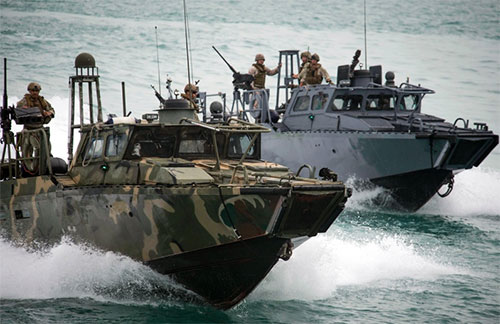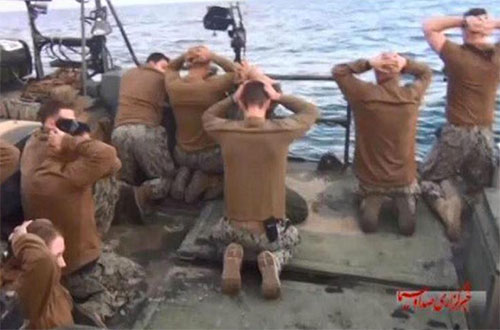Incompetence in the Persian Gulf
This is a sad, but necessary read, forwarded to me from a retired senior officer. I read it in disbelief.
The alternative was to write about the other elephant this has taken up residence in our collective living room, and to that I can only offer my sympathy to the people of Nice, and say “Vive la France!” The French people have been through a lot this year.
Incompetence in the Persian Gulf
The US Navy has Severe Problems

Like, Duh!
I have been answering innocent questions from puzzled civilians for months about how it was that two USN ships surrendered to the Iranians. It was becoming irritating, since I did not want to comment until the investigation was complete and released.
This is a slightly de-ganed version of the original article that appeared on a site called US Defense Watch, and was written by a fellow named James Starman. I have de-fanged some of the more rabid side remarks, not to censor Mr. Starman, but rather to focus on how galling the deficiencies in our system have become without rambling too far into the realm of the political. But of course that is what it is at the heart of things. The Secretary of the Navy, for example, has announced that he will be evaluating officers command major installations for their commitment to averting Climate Change, and has embraced biofuels as a critical warfighting capability. Since 2009, he has spent and awarded in partnership with USDA and DOE $267 million for biofuels and biorefineries, and received a total of 850,000 gallons of biofuel — $312 in taxpayer funds spent per gallon. I am not kidding. That is how bad things have become.
If you want it with all the snide comments and vitriol (there are plenty left), the complete article is at:
http://usdefensewatch.com/2016/07/cowardice-and-incompetence-in-the-persian-gulf-the-us-navy-has-severe-problems/
Navigation is a sailor’s bread and butter. Not knowing navigation is tantamount to a hockey player not knowing how to skate.
The radios weren’t working. The two craft, Riverine Command Boats 802 and 805, left four hours late for their mission because they could not get their radios to work.
This speaks volumes about poor non-commissioned officers, aka Chief Petty Officers, who obviously weren’t ensuring that the radios had proper maintenance, or were CASREPed and replaced.

One wonders what the officer in charge, Class of 2011 Naval Academy graduate Lieutenant David Nartker was doing instead of checking on his boats’ equipment.
None of the 10 sailors on either vessel had ever participated in a mission this long.
The crews had already voiced their concerns: they weren’t ready for this mission. It would be the longest mission they’d conducted, and would require a nighttime refueling – another thing that they’d never done.
Obviously, a real world mission in the Persian Gulf is a lot tougher than attending one of the military’s classes on why the Bible is a sexist document or conducting physical training with pregnancy simulators.
Things quickly went from SNAFU to TARFU to FUBAR as they drifted into Iranian waters. At the critical moment when the navigation system identified Iran’s Farsi Island for them, none of the 10 sailors picked up on that information because no one zoomed in on the island that the system was displaying. They also didn’t look at backup navigational charts on the boats or call in their location to one of their maritime operations centers.
The crews thought they would go around the island. But boat 802’s engine experienced a dangerous oil pressure drop, and cut speed. Boat 805 also dropped speed and came alongside. Boat 802’s engine problems could have been fixed with the boat still moving, but the crew decided to stay put and fix the issue there. Despite the fact that they still had a visual on an unknown island and did not know their exact location, the boat captains did not have their gunners on watch to protect the craft while the repairs were under way. They thought repairs would take 20 minutes.
A few minutes later, they saw two small patrol craft approaching. At 1,000 yards, the captain of boat 802 saw the incoming vessels had weapons. But he still did not tell his crews to take a defensive posture.
He would later say he thought the vessels might have been friendly, from Saudi Arabia. Obviously, when you don’t look at charts and fail navigation exams you have no idea if you’re in Baja or Beijing.
By the time the vessels were within 100 yards, the two U.S. boats manned their guns. Then they saw the blue flag of the Iranian Revolutionary Guard Corps. The U.S. crews started yelling, trying to communicate by pointing to their wrench and engine that they were broken down. This wasn’t an incursion.
By then, two additional Iranian vessels were headed toward them. Lieutenant Nartker failed to order the crews to fire at least warning shots. Instead, Nartker did order the boats to speed away. But by then it was too late, the Iranians were able to block their vessel and had their weapons fixed on boat.
The crew’s coxswain saw the Iranian’s AK-47s were close enough for him to see they were pointed at his gunner. When the captain wanted another attempt to go, the coxswain said “no.”
“I tell the [boat 802] captain that we are not moving. [The boat 802 captain] said we just got to go and if they shoot through us then whatever. I am having this dumb conversation with him about how I am not going to drive. I am not going to get the [boat 802] gunner killed,” according to the investigation.
At that point, Nartker started negotiating with the Iranians. “So at that point in time if I had decided to start a firefight, I know a lot of my guys would be dead. We might have all been dead at that point in time. I didn’t want to start a war with Iran, either … my thought at the end of the day was that no one had to die for a misunderstanding. And that, I guess, was a gamble on my part. I don’t want to say gamble because that is not exactly the right word, but in allowing us to be captured – that was my decision and my decision alone.”
Nartker’s conduct immediately endangered his whole crew by delivering them into the hands of a nation led by psychopaths and religious zealots. He seemed more concerned about not harming Iranians than he was about doing his duty as a US Navy officer.

The crews raised their hands and kneeled. The boats were boarded. Once on board, the Iranians tore down the U.S. flags and replaced them with their own.
As they were filmed kneeling and bound, the female gunner on the crews activated the distress signal. The Iranians discovered her actions, and confiscated the device.
What the investigation found was that Nartker should have had his crew in a defensive posture while the downed vessel was getting repaired.
It did not rule on his decision to surrender the boats to the Iranians, noting the Defense Department’s Code of Conduct does not clearly outline what actions an officer should take in regards to surrender if the situation occurs in non-armed conflict.
The Code of Conduct clearly states how Nartker should have acted and he violated Articles II and V. The investigation also found Natker acted honorably by directing the Iranians not to film his crew, but his filmed apology “was clearly inconsistent with the Code of Conduct.”
” Nartker was in captivity for 15 hours and he submitted to making an apology. His acquiescence is worrisome. Does anyone in the Navy have any conception of how the Vietnam POW’s resisted North Vietnamese repeated attempts for them to make public apologies?
Our POW’s in North Vietnam were routinely tortured for weeks or months until they broke and signed statements or agreed to be filmed. Nartker’s excuse was that the Iranians threatened not to release him and his men if he didn’t make a formal apology on worldwide TV.
Nartker gave in and the Iranians never even laid a hand on him or his men. They didn’t have to. The report also found that the crew members improperly revealed passwords for laptops and cellphones and even sensitive technical details about their two ships, including their top speed, capabilities and missions, the report said.
“It is clear that some, if not all, crew members provided at least some information to interrogators beyond name, rank, service number and date of birth,” the report said.
In the aftermath, the Navy has recommended administrative actions against the task force commander and commodore, both of whom have already been carried out and both have been relieved of command. It has recommended its investigation be sent to each of the commands overseeing the executive officer directly responsible for the two boats, the captain of boat 805, and the coxswain of boat 805 who challenged the captain of boat 802’s decision to try to flee the Iranian vessels.
The investigation found that Nartker failed in many of the expectations that the Navy had of him. But the Navy also reported the lieutenant’s relative inexperience, low rank at the time and the extreme situation should be put in the context of the lack of oversight or mentorship his commanders had afforded him.
Wait a minute. David Nartker is a Lieutenant, not some green ensign with one week of active service under his belt. Nartker has been on active duty for several years. It’s his job to make tough decisions and to show courage. It’s also his job to look out for his crew. He failed at every task given to him.
Younger men than Nartker, with much less experience and without the prized Annapolis training have performed heroically throughout the history of the Navy. The Navy needs to stop making excuses for the poor conduct of its officers.

Lastly, the report found that the female gunner should “receive proper recognition for her extraordinary courage in activating the emergency beacon while kneeling, bound and guarded at Iranian gunpoint, at risk to her own safety.”
Apparently, the female gunner in Nartker’s crew was the only one who seemed to understand their duty and who exhibited courage. The fallout from the incident has already resulted in the removal of the commodore and executive officer responsible for the vessels, Capt. Kyle Moses and Cmdr. Eric Rasch.
A third officer who was in charge of the detachment in Kuwait, who was not named, was also relieved of command, Chief of Naval Operations Adm. John Richardson announced in a news briefing on the investigation findings.
The incident in the Persian Gulf last January should be a wake-up call for the US Navy. Not only were the sailors and officers in question lacking in training, they also had a desultory mentality toward maintenance of their equipment.
When called upon to act courageously, they conducted themselves poorly and disgraced their service and their country while in captivity. The US Navy has severe problems. This incident may have been isolated, but it speaks volumes about the declining readiness and warrior spirit in our military.
Copyright 2016 US Defense Watch, James Starman and Vic Socotra
